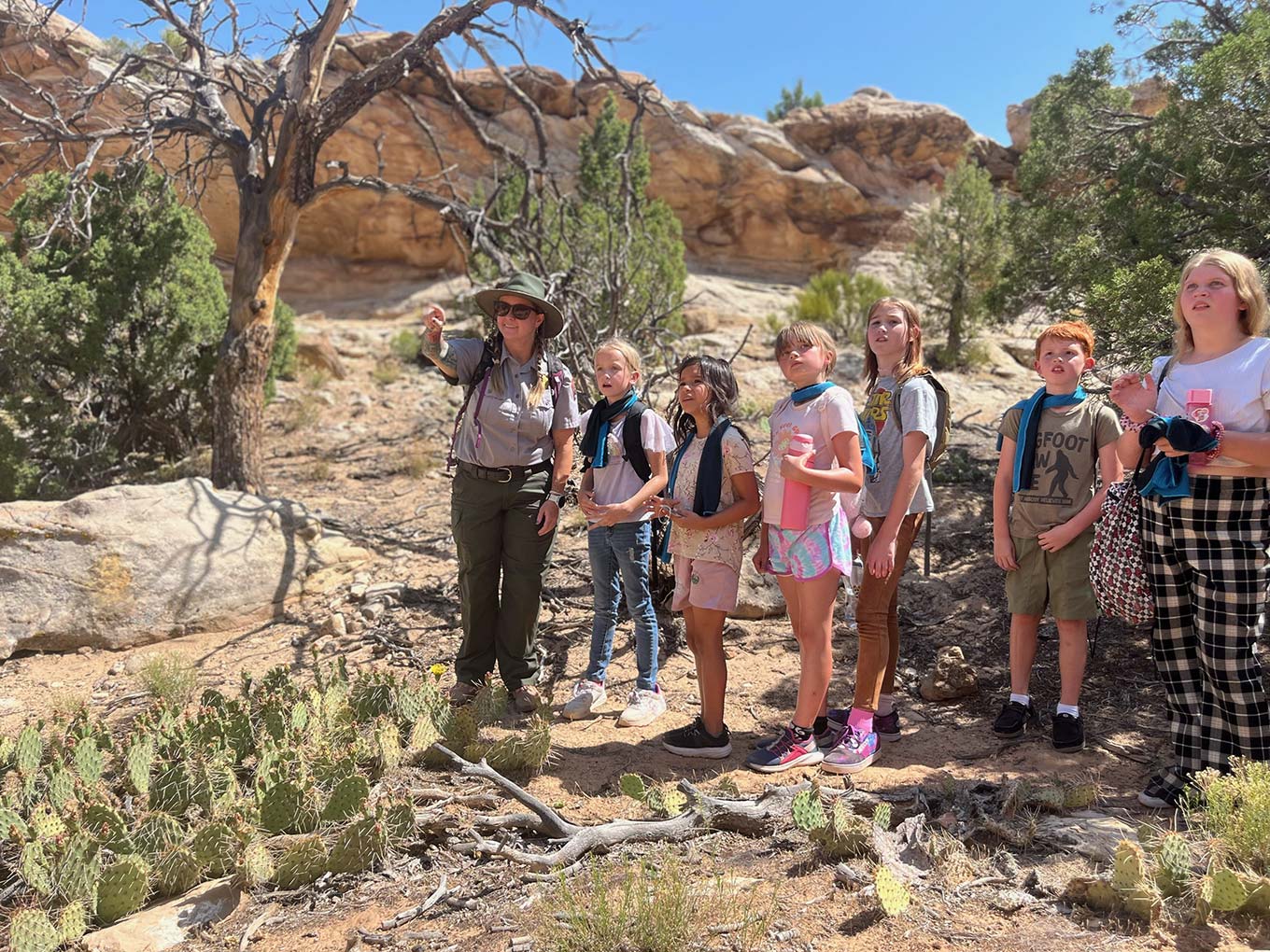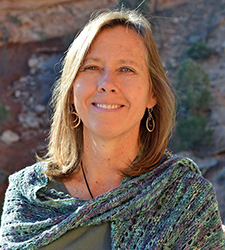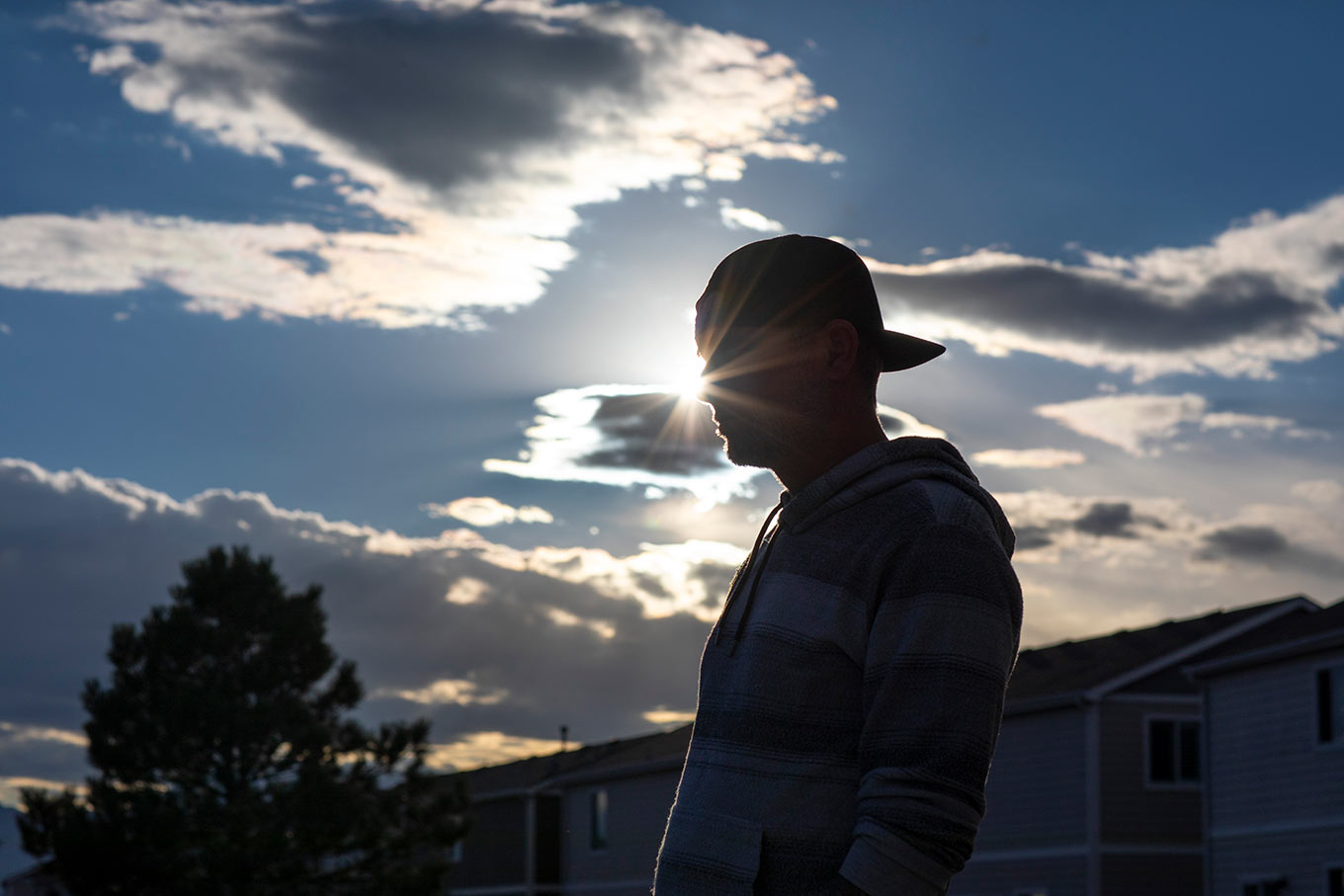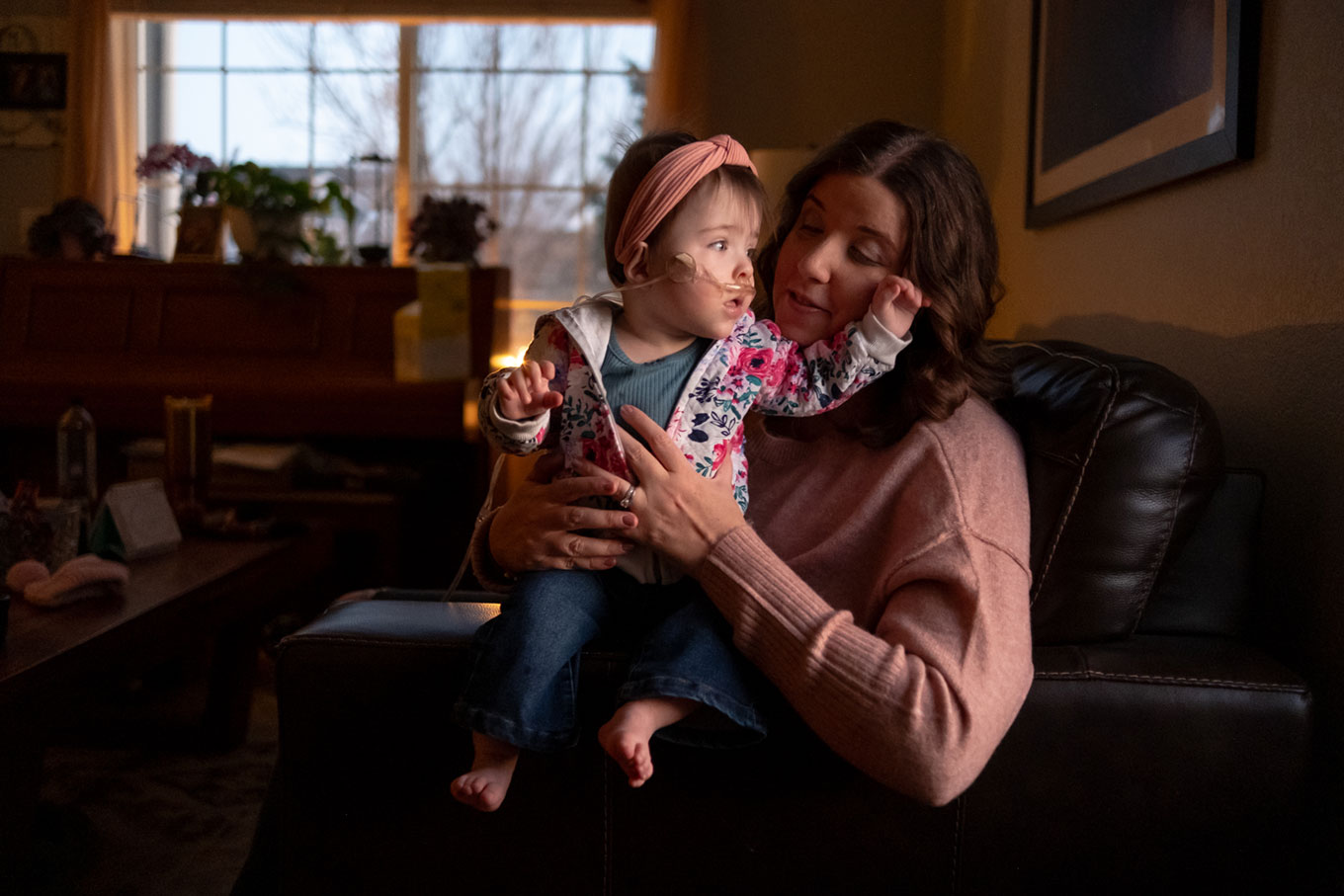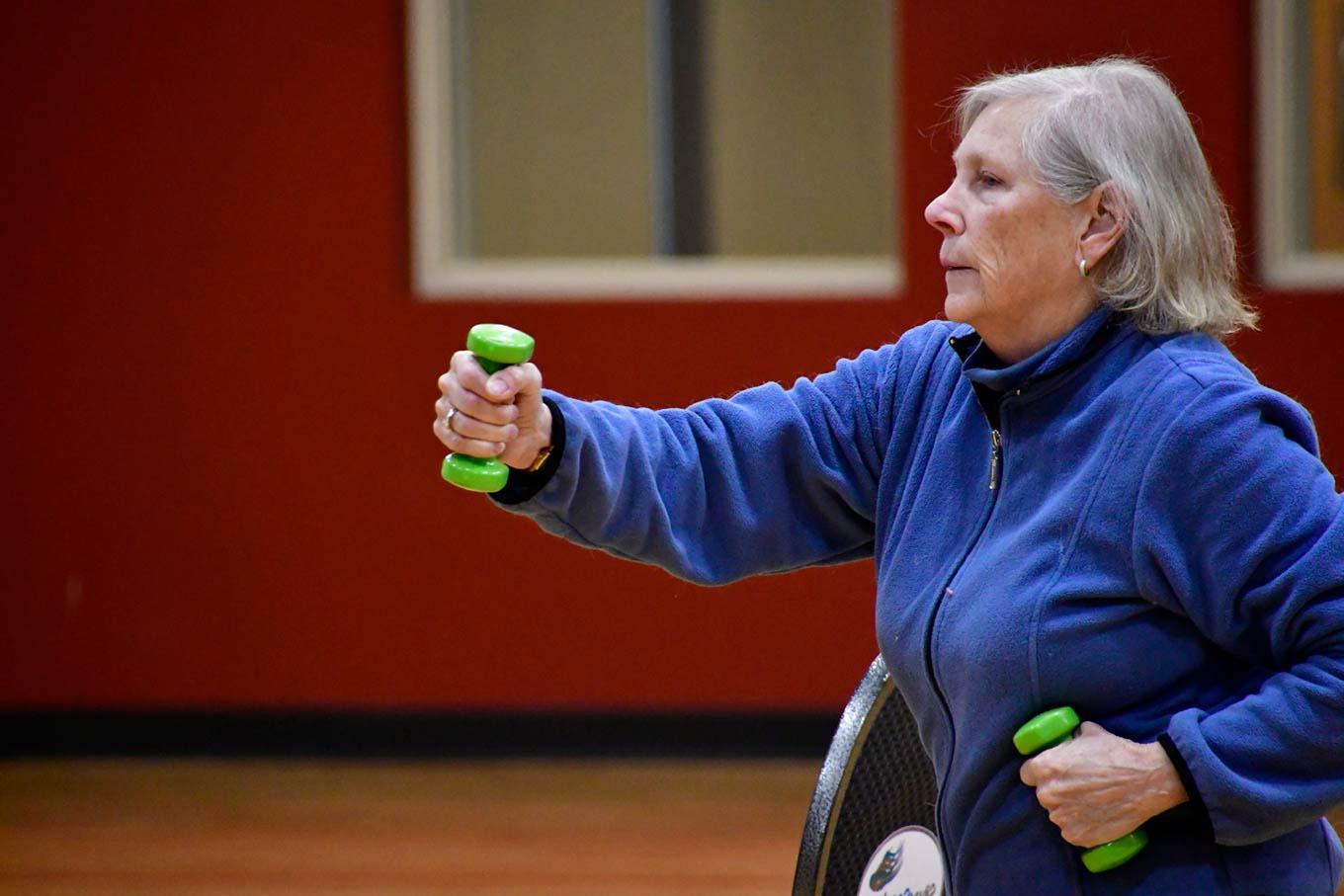On a warm June morning, National Park Service Ranger Amber Martin led nearly two dozen children hiking in Colorado National Monument. After examining a pinyon pine tree, Martin referred the kids to a bird identification pamphlet, noting the symbiotic relationship between the tree and the pinyon jay. She explained how the bird harvests the tree’s pine nuts, then buries them throughout the park, where they sprout and grow into trees.
But this hike wasn’t just for teaching kids local flora and fauna. Martin, a 40-year-old U.S. Air Force veteran who served tours in Afghanistan and Kuwait, is leading a unique park service program designed to help people improve their mental health by increasing access to the outdoors.
The children were brought by the nearby Riverside Educational Center (REC), and for many, it was their first time visiting the national monument, adjacent to Grand Junction. They were participating in the monument’s Resiliency Ranger program, launched in 2024 to “uplift and empower the community through resilience-focused efforts.”
The group met at Devil’s Kitchen Picnic Area, where Martin handed out “Resiliency Ranger Mental Health and Wellness Workbooks” to the kids.
“What does resiliency mean to you? When something happens to you and you’re not happy about it, what do you do?” Martin asked the group of kids and REC staff members.
Martin told the young hikers how paying attention to nature “helps calm the brain.”
“We bring skills to the outdoors—of being present, watching wildlife, and identifying plant species,” Martin said. “Being mindful and present slows down the brain and makes it easier to make decisions. We’re bringing nature and mental health together.” Martin has presented the Resiliency Ranger program to military veterans, LGBTQ+ community members and youth groups.
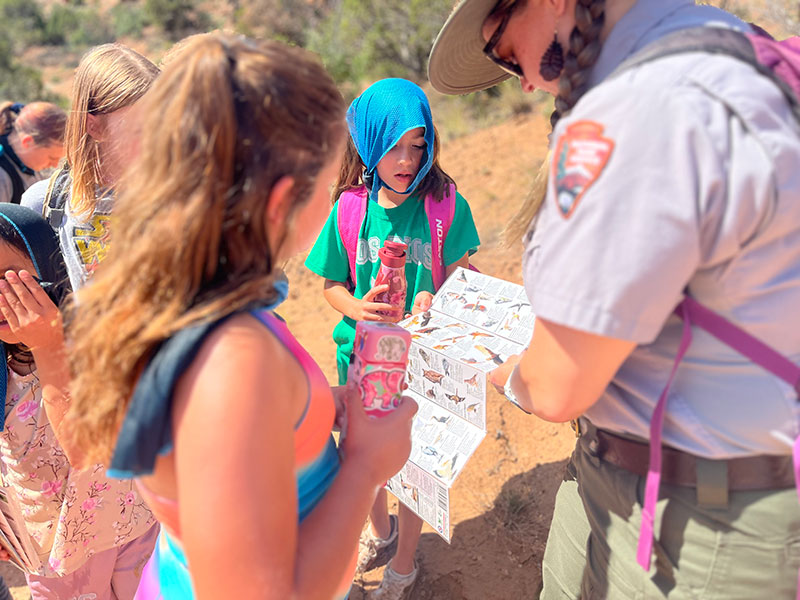
Colorado National Monument Ranger Amber Martin (r.) shares a guide detailing bird wildlife with Kinsley, 8 (center), one of the children who visited Colorado National Monument on June 17, 2025, with Riverside Educational Center in Grand Junction to participate in the monument’s Resiliency Ranger program, which Martin oversees. Photo by Sharon Sullivan / Special to The Colorado Trust
Nathan Souder is the superintendent at Colorado National Monument. In October 2019, his first month on the job, there were five suicide attempts and one death by suicide at the park. Colorado has one of the highest suicide rates in the country, and Mesa County’s rate is among the highest in Colorado.
Grand Junction dispatch alerts both local law enforcement and the park service when it receives calls regarding a person experiencing a mental health crisis anywhere in Mesa County, inside or outside the park. But the person’s exact location may be unknown, said Souder.
“We get calls for possible suicides every week,” Souder said. When that happens, “Our team goes out across Rim Rock Drive”—the 23-mile road that crosses the monument—“and checks every overlook and pullout.”
Sounder said park rangers face a significant mental burden when looking for people, often not knowing who or what they will find.
“I don’t know a year when [a suicide in the park] hasn’t happened. It’s a weight on my staff,” Souder said.
Souder enlisted support from an internal leadership program in the National Park Service to address the issue. Fifty park service employees nationwide were divided into teams to propose various projects focusing on mental health. They interviewed Mesa County subject matter experts and identified target audiences.
Six viable project ideas emerged. Souder brought the proposals to Jennifer Daniels, a Mesa County Suicide Prevention Coalition facilitator. Daniels helped Souder prioritize projects, including the Resiliency Ranger program.
“In 2023, 40 people died by suicide in Mesa County,” said Daniels, who also directs Mesa County Public Health’s new Behavioral Health Division. Thirty people per 100,000 die by suicide in Mesa County annually, about double the national rate in the general population.
The Resiliency Ranger program “takes the natural environment and connects it to mental health. It talks about how to build resilience, relating it to resilience found in nature among animals, insects and plants,” Daniels said.
Souder secured funding to hire Colorado Mesa University interns with graphic design, social work and mental health care backgrounds to create the Resiliency Ranger Mental Health and Wellness Workbook, with School District 51 guidance counselors providing content expertise. While the workbook is geared toward middle school students, copies are given to all participants. Resiliency Ranger sessions are tailored as needed, said Martin.
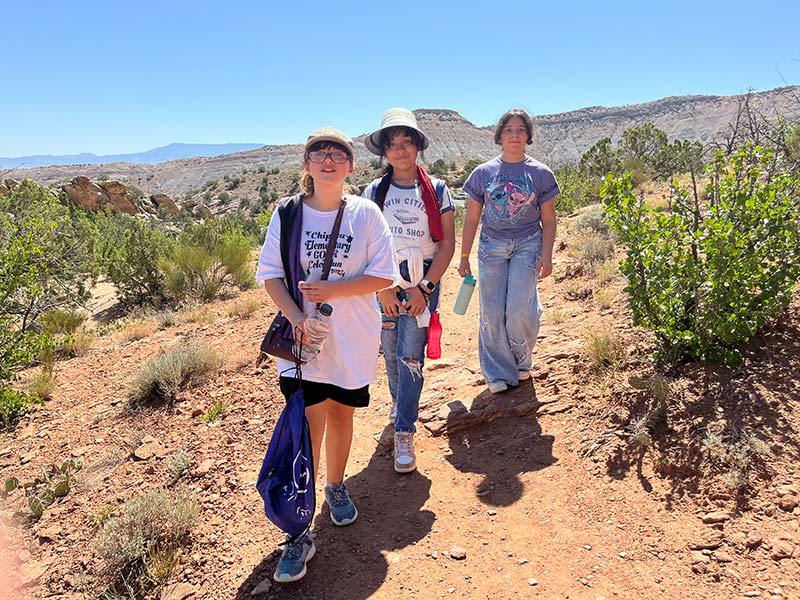
(L. to r.) Lisa, Alondra and Emily, all age 11, hike at Colorado National Monument on June 18, 2025. The children visited Colorado National Monument with Riverside Educational Center in Grand Junction to participate in the momument’s Resiliency Ranger program. Photo by Sharon Sullivan / Special to The Colorado Trust
Daniels said that veterans and youth were identified as priority populations for this effort. The Veterans Administration (VA) reported in 2022 that veteran suicide rates in Colorado are significantly higher than those in other states and the general population overall. Outdoor therapy is often used to treat veterans suffering from PTSD, depression, anxiety and other mental health issues.
Suicide is the leading cause of death for youth and young adults in Colorado, according to the Colorado Department of Public Health and Environment. Access to green space is associated with improved mental well-being and overall health, and research suggests this can be “especially beneficial to socioeconomically disadvantaged youth.”
Martin graduated from Colorado Mesa University in May 2024 with a bachelor’s degree in outdoor recreation industry studies and a minor in social work. As a student, she worked as a veteran liaison for the school’s Outdoor Program and Veteran Services to increase veteran students’ participation in outdoor activities.
Her experience helping veterans also includes volunteering for the VA’s recreation therapy department and the National Disabled Veterans Winter Sports Clinic. She also serves as chapter coordinator for Team River Runner, which offers adaptive paddle sports for veterans.
“I went back to school for outdoor recreation and social work to get my brothers and sisters back outside,” Martin said. “Many who have been traumatized feel left out, alone.”
Souder offered Martin an internship through the Colorado National Monument Association in 2024 to develop the Resiliency Ranger program, and she was hired by the park service earlier this year to pilot it with various groups that might have limited access to outdoor recreation. In the first six months, she led more than 20 hikes and presentations for more than 350 participants.
One of those participants was 54-year-old Grand Junction resident Dana Liesegang, who served in the U.S. Navy from 1990 to 1992. Liesegang was discharged after being assaulted by a fellow soldier. She suffered multiple injuries and relies on a wheelchair for mobility. Liesegang learned about the Resiliency Ranger program from the Grand Junction VA Medical Center.
Liesegang had always wanted to hike the monument’s Serpent’s Trail. This year, using a motorized wheelchair and with Martin’s assistance, she was able to experience the Serpent’s Trail and another monument trail. Martin walked beside her, sharing meditative musings, as Liesegang navigated her wheelchair down the trail. A VA recreational therapist walked ahead with other veterans.
“It was challenging and scary, but super fun and liberating. It boosted my spirits a ton,” Liesegang said. “It’s something I’d encourage veterans with PTSD to do. Recreation programs keep traumatized veterans alive. It gets them out of the house and into the world.”
Souder says he’s spoken with at least one Department of the Interior official who wants to see the Resiliency Ranger program implemented at national parks across the country and in other federal agencies, such as the Bureau of Land Management and the Department of Fish and Wildlife. Souder has provided the White House with briefing statements and Resiliency Ranger workbooks.
After the hike with the kids in June, Martin returned to the picnic area and reminded them about coping skills and symbiotic relationships they had observed in nature.
“Maybe you know someone you can share these skills with if you see they’re not having a great day—skills like deep breathing, going for a hike, taking photos… they are all calming activities,” Martin said, adding: “When you leave here today, make a point to make friends with the collared lizard, the bighorn sheep or golden eagle.”
